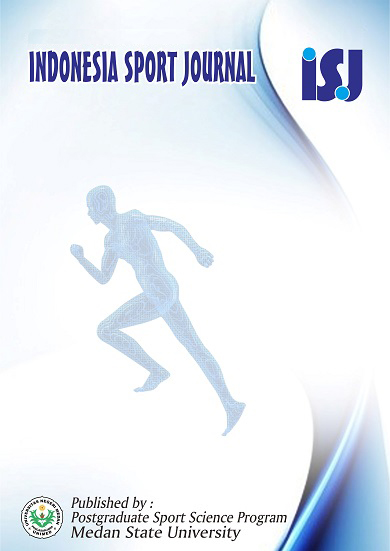PSYCHOLOGY OF NORTH SUMATRA PENCAK SILAT PELATDA ATHLETES TOWARDS PON XXI
DOI:
https://doi.org/10.24114/isj.v6i2.54535Abstract
In facing this big event which is held every 4 years, the National Sports Week is a place to "show off" for sports people in Indonesia. There are many things that need to be prepared, starting from the venue, competition equipment, supporting infrastructure to the community's readiness to welcome this "Party". Several factors influence athletes to be able to achieve achievements in a sporting event, including physical readiness, intensive training, strategic maturity and mental health to compete. Not infrequently mentality is a determining factor in competition. Long training and physical abilities as well as good strategies will be destroyed in the competition arena if the athlete's own mental state is not developed. Athletes' mental health will become increasingly disturbed as the match gets closer. A good coach certainly prepares and pays attention to his team's children from all aspects.In an effort to provide mental development for athletes, this research tries to identify facts in the field. This research data will be taken factually from individual athletes using a personal approach and also questionnaires as data support. The results of the research will show how each athlete's mental health is before competing, so that coaches can take steps to encourage, motivate and indoctrinate athletes who have mental disorders. Anxiety, fear, decreased concentration, lack of self-confidence, lack of enthusiasm, lost aggressiveness, and even intelligence in competition are mental factors that influence performance in the arena. If these factors can be minimized as early as possible, then 75% of athletes' wins are in sight. A healthy mentality when competing will greatly influence your performance. No matter how strong the opponent is, it will be very easy to beat if the athlete has a good mentality.The aim of this research is to provide accurate information regarding the mental state of North Sumatra Pencak Silat Pelatda athletes in 2023 in preparation for the XXI PON competition.References
Arripe-longueville, F., Saury, J., Fournier, J., & Durand, M. (2001). Journal of Applied Sport Coach-Athlete Interaction during Elite Archery Competitions :An Application of Methodological Frameworks Used in Ergonomics Research to Sport Psychology. JOURNAL OF APPLIED SPORT PSYCHOLOGY, 13(3), 275“299. https://doi.org/10.1080/104132001753144419
Azandi, F., Al Munawar, A., Syaleh, M., & Riza, A. R. KECERDASAN EMOSI (EQ) ATLET PELATDA PETANQUE JANGKA PANJANG PON 2024. Sains Olahraga: Jurnal Ilmiah Ilmu Keolahragaan, 6(1), 50-58.
Bebetsos, E. (2015). Psychological skills of elite archery athletes. JOURNAL OF HUMAN SPORT & EXERCISE, 10(2), 623“628. https://doi.org/10.14198/jhse.2015.102.09
Birrer, D., & Morgan, G. (2010). Psychological skills training as a way to enhance an athlete ™ s performance in high-intensity sports. Scandinavian Journal of Medicine and Science in Sports, 20(2), 78“87. https://doi.org/10.1111/j.1600-0838.2010.01188.x
Caruso, C. M., Dzewaltowski, D. A., Gill, D. L., & Mcelroy, M. A. (2016). Psychological and Physiological Changes in Competitive State Anxiety During Noncompetition and Competitive Success and Failure, 12(1), 6“20. Retrieved from https://sci-hub.tw/10.1123/jsep.12.1.6
Dimyati, D. (2019). Comparison of Psychological Skills Between Pencak Silat and Karate. Journal of Martial Arts Anthropology, 19(3), 50“55. https://doi.org/10.14589/ido.19.3.6
Dongoran, M. F., & Kalalo, C. N. (2020). Profil psikologis atlet pekan olahraga nasional (pon) papua menuju pon xx tahun 2020. Journal Sport Area, 5(1), 13-21.
Effendi, H. (2016). Peranan psikologi olahraga dalam meningkatkan prestasi atlet. Jurnal Ilmu Pengetahuan Sosial, 1(1), 22“30.
Filho, E., & Moraes, L. (2008). Affective and Physiological States During Archery Competitions : Adopting and Enhancing the Probabilistic Methodology of Individual Affect-Related Performa .... Affective and Physiological States during Archery Competitions : of Individual Affect-Related.JOURNAL OF APPLIED SPORT PSYCHOLOGY, 20(20), 441“456. https://doi.org/10.1080/1041320080224522
Hastuti, T. A. (2013). Karakteristik Psikologis Atlet di Pusat Pendidikan dan Latihan Pelajar (PPLP). Jurnal Psikologi, 40(2), 143“158. https://doi.org/https://doi.org/10.22146/jpsi.697
Kamata, A., & Tenanbaum, G. (2002). Individual Zone of Optimal Functioning (IZOF): A Probabilistic Estimation.Journal of Sport and Exercise Psychology, 24(2), 189“208. https://doi.org/10.1123/jsep.24.2.189
Keliat, P., Syaleh, M., & Al Munawar, A. Development of Android-Based Pencak Silat Learning Media for High School Students. Journal Physical Education, Health and Recreation, 5(2), 155-161.
Komarudin (2013). Psikologi Olahraga. Bandung: Penerbit PT Remaja Rosdakarya
KONI, 2016.Sejarah. Jakarta: KONI Indonesia, http://www.koni.or.id/index.php/id/about-us/sejarah, di akses tanggal 12 Oktober 2023
Magill, R. A., & Ash, M. J. (2013). Academic, psycho-social, and motor characteristics of participants and nonparticipants in children™s sport. Research Quarterly of the American Alliance for Health, Physical Education, Recreation and Dance, 50(2), 230“240. https://doi.org/10.1080/10671315.1979.10615605
Masters, Chu-Min Liao, R. S. W. (2002). Self-Focused Attention and Performance Failure under Psychological Stress.Journal of Sport and Exercise Psychology, 24(3), 289“305. https://doi.org/https://doi.org/10.1123/jsep.24.3.289
Milavic, B., Padulo, J., Grgantov, Z., Milić, M., Mannarini, S., Manzoni, G. M., ... & Rossi, A. (2019). Development and factorial validity of the Psychological Skills Inventory for Sports, Youth Version“Short Form: Assessment of the psychometric properties. PloS one, 14(8), e0220930.
Nanda, F. A., & Dimyati. (2019). Psychological Skills of Indonesian Basketball Athletes in Asian Games 18.Journal of Physical Education , Sport , Health and Recreations, 8(659), 37“43. https://doi.org/https://doi.org/10.15294/active.v8i1.28823
Nasution, L. M. (2017). Statistik deskriptif. Hikmah, 14(1), 49-55.
Tan, S. L, Koh, K. T, & Kokkonen, M. (2016). International and Multidisciplinary Perspectives The perception of elite athletes ™ guided self-reflection and performance in archery, 17(2), 207“220. https://doi.org/10.1080/14623943.2016.1146582
Taylor, I., Boat, R., & Murphy, S. (2018).Integrating theories of self-control and motivation to advance endurance performance. International Review of Sport and Exercise Psychology, 10(10), 1“20. https://doi.org/10.1080/1750984X.2018.1480050
Undang-Undang No 3 tahun 2005, Sistem Keolahragaan Nasional. Jakarta: Biro Humas dan Hukum, Kementerian Negara Pemudadan Olahraga RI





